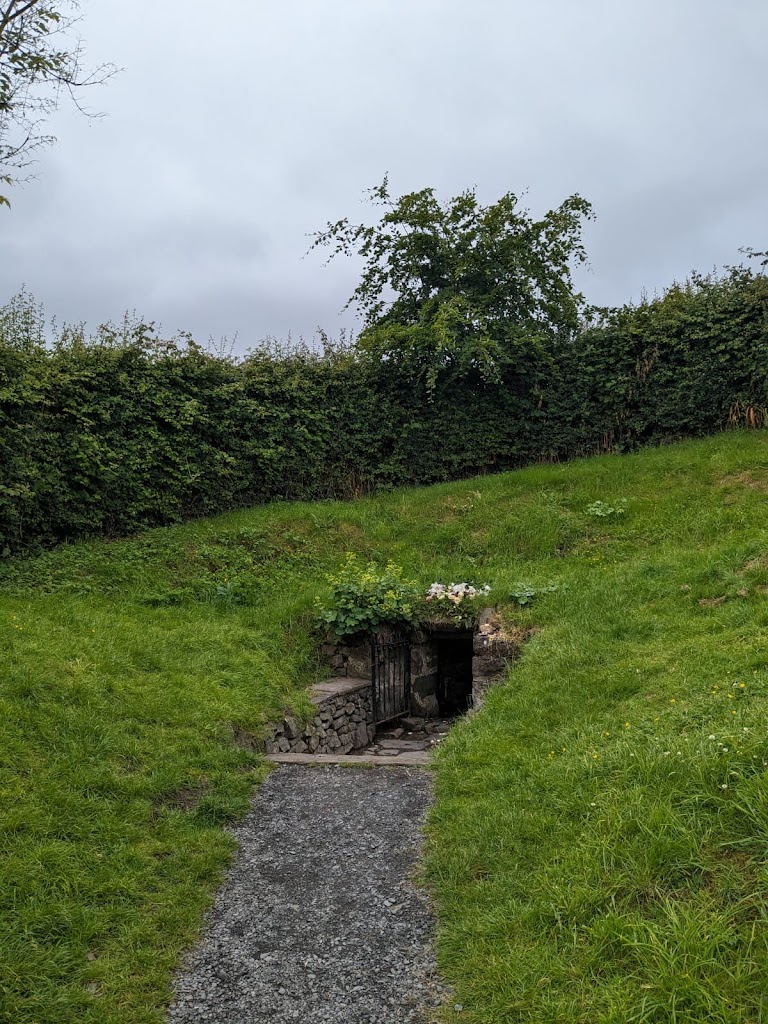Tarot card of the day: 7 of swords
(picture I took of a holy well near the Hill of Tara in Ireland)
Has a fairy stolen into your camp? Convinced you to come with him, to dance and sing, to help you obliterate your sense of lack or to let you indulge in “not enoughness”? (reference to the podcast here: https://www.tarotforthewildsoul.com/episodes-transcripts/ep-174-the-myth-of-not-enoughness-with-seven-of-swords) Sevens, like the other odd numbers in the Tarot, are an imbalance of some kind, this time from harmony and the lull of the sixes. The sevens are a challenge. And when combined with swords, this suggests the hero is facing a mental challenge of some kind. A mental challenge is something internal, but we deal with it externally, with swords. A knight is only a knight through action.
The image depicts a man (the fairy?!) escaping down a rope with five swords, though he’s left two behind on the top of the cliff. Also at the top stands a tent with its flap swung open. Whether you’re the fairy, or you’ve let a fairy take you and your sanity with him, something here suggests something was stolen.
In a culture that worships rationalism, I’m inclined to side with the fairy here. We need a little more of the irrational, the Other world. Maybe the hero in the image is stealing back our ability to feel. But we have to remember fairies aren’t totally trustworthy either; they may have their own intentions. And most of the old folk tales of fairies are a warning to be wary of them, or you might never return; or if you do, it’s years later and you don’t remember a thing (JM Barrie’s play “Mary Rose” is a marvelous read where that happens).
There are so many good fairy stories and poems to choose from. I’ve landed on Keats’ “La Belle Dame Sans Merci.” For one thing, it’s about a knight (swords!) and a fairy. And another, because of Keats’ literary theory about negative capability, something Western culture has attempted to obliterate. About “negative capability,” Keats said this:
“. . . I mean Negative Capability, that is when man is capable of being in uncertainties, Mysteries, doubts, without any irritable reaching after fact & reason. (Letter XXIV—December 21, 1817) “
(qt’d in Martin Earl’s 2011 article on the poem in Poetry Foundation here: https://www.poetryfoundation.org/articles/69748/john-keats-la-belle-dame-sans-merci )
This poem, then could be exploring the sense of negative capability Keats describes here. But the knight is sick and pale, despite the harvest being done, and even the squirrel’s “granary is full.” The knight answers: “I met a lady in the meads,/Full beautiful—a faery’s child,/Her hair was long, her foot was light,/And her eyes were wild.” The knight continues to describe her beauty and lush landscape and how he was lured into it. But then the descriptions of what he saw repeat his own pale complexion; the landscape turns upon him. He saw “pale kings and princes” and “pale warriors,” and they, these other victims of the fairy, warn the knight that the fairy has her in his “thrall.” Though the knight should feel liberated, he feels haggard, as if he overconsumed the very thing that should have liberated him (also excellent take on this is Susanna Clarke’s Jonathan Strange & Mr Norrell).
What do we do, then, if to indulge in the emotions, the world of “uncertainties, mysteries, doubts,” means they betray us this way? The key may be an actual key: a key back to the world of certainty (not that I’m convinced we can ever be certain of anything). And the fairy-thief in the Tarot card has done just that, by leaving two swords on the cliff top. But the stories of fairies contain a lunar logic too, that the world of seeking (proving) only certainty is just as dangerous, just as pale of a place and leaves us just as haggard and “withered” as the grass the knight in “La Belle Dame” describes.
So? I’m going with the fairy who’s stealing back my irrationalism from the tent of Civilization and heading to Heathendom.
Bibliography:
Keats, John. “La Belle Dame Sans Merci.” Poetry Foundation. https://www.poetryfoundation.org/poems/44475/la-belle-dame-sans-merci-a-ballad

